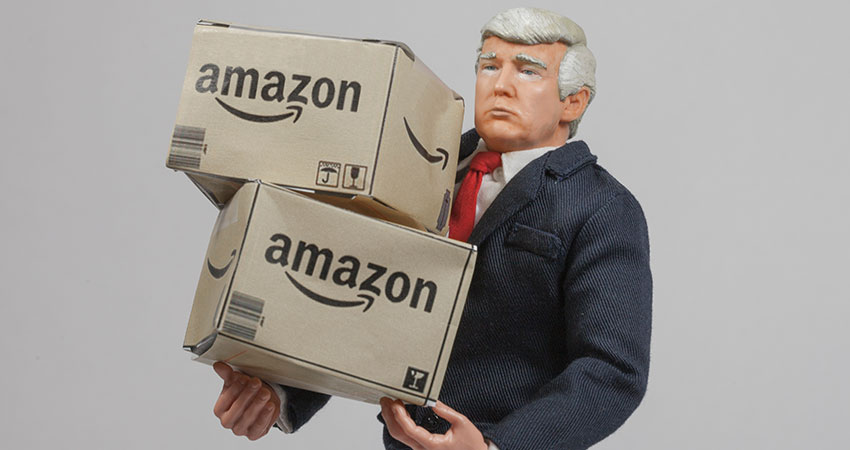Almost every shipper I talk to references their company’s Amazon strategy. I have yet to hear one that sounded vaguely impactful enough to even rise to the level of rounding error. First of all, why is Amazon such a legacy retail assassin?
Much has been written on different aspects of Amazon’s secret sauce. For example: Free delivery (be it 2 days, 1 day or eventually 0 days), AWS, Prime, Prime Air, Scout delivery robots, its own delivery fleet/DSPs, Flex, Lock, Fulfillment by Amazon, its marketplace, private label brands, Sen. Elizabeth Warren’s antitrust noises, President Donald Trump’s non-bromance with Jeff Bezos, and of course logistics overall, aka the next front in the great ecommerce wars.
The thing that makes my brain throb is when people talk about logistics as a solo anti-Amazon strategy. Let’s say that a logistics superhero from the planet Brandazonia magically teleported to Earth and matched Amazon’s logistics prowess chapter and verse. Even then, Brandazonia Man with all his awesome superpowers would not be able to keep retailers from getting crushed like a bug.
Why? Amazon is a unique blend of a consignment and regular retailer (marketplace), the most pervasive loyalty program EVER (Prime), a technology company founded with itself as the biggest customer (AWS), and increasingly a logistics powerhouse the likes of which our industry has never seen. From a logistics point of view, they are a 1PL, 2PL, 3PL, 4PL, and yes, when some consultant invents it in the future, the first 10PL.
It is the synthesis of things they do so well that makes them seemingly invulnerable. To me, trying to beat Amazon on just logistics without a symbiotic combination of brand, merchandising, marketing, technology and a financial war chest is just pure, unadulterated sophistry.
When I have discussed this topic with logistics colleagues, some say, “Okay smart guy, what’s your anti-Amazon strategy?” I actually have an idea, but be aware it has a low probability of ever happening: All the well-known retailers and brand manufacturers simultaneously stop selling there. Like I said, not going to happen, but might something of a brand revolt be starting?
Nike recently announced it was pulling its products from Amazon. Could others follow? Maybe, but I tend to think few have the cajones John Donahoe demonstrated after he recently became Nike CEO. I’m not sure how it will work out going it alone, but I give Donahoe credit for trying to play the game differently.
What would my Seinfeld bizarro world look like? Amazon is an online mall of branded and unbranded merchandise. Why couldn’t all of the best brands create their own Brandzonia online mall, their own Brandzonia Prime, their own Brandzonia AWS, and their own Brandzonia logistics network? Imagine a world in which Brandzonia merchants only sold their cool branded stuff on a direct to customer basis, sans the Amazon channel.
In my vivid imagination, Amazon would become the online flea market to the “who-gives-a-damn, no-name” merchants. Couple that with figuring out how to really scale the omnichannel shopping experience and Amazon might take notice, but it might also cause them to accelerate their march into private brands.
Therein lies the only anti-Amazon strategy I can envision. One of my FedEx friends asked me, “Why couldn’t Brandzonia happen?” Simple. It is the same kind of hubris that caused Facebook, Google, FedEx and UPS to not see the canary in the coal mine 25 years ago when Amazon was just selling books.
Jeff Bezos went the logistics route because he felt Google and Facebook would not follow. He was right. Not so long ago, UPS was saying Amazon is a competitor and FedEx was saying they were not. Who else besides Amazon could get the duopoly this flustered?
Who are the winners and losers in a world with an increasingly dominant Amazon? For now, UPS seems to be making it work, but how long will that love affair last? As noted, FedEx has recently admitted that Amazon as a competitor is not “fantastical” and has taken a hit by losing their business. Same with the U.S. Postal Service.
We as regional carriers collectively have about 5% of the domestic parcel market, and will continue to grow rapidly as every retailer and brand manager searches for more cost-effective, user-friendly alternatives to FedEx and UPS. LSO is going to double its volume year-on-year for exactly these reasons.
In real estate, warehouse footprints that cater to fulfillment will do really well. On the other hand, malls will either become churches, universities and entertainment complexes – or die. Delivery van OEMs and routing technology companies will also do well.
Meanwhile, back in the real world, Amazon marches on as the most amazing game changer in the history of mankind. Get used to this being the new world order if the retail industry tries to beat Amazon on fast delivery alone. Being someone who has an affinity for retail, I hope the industry finds a better solution than mine. If so, all boats will rise including Amazon’s.
Richard Metzler is the President and CEO of LSO/Lone Star Overnight. He will be speaking as part of a panel on trends in regional carriers at Ecommerce Operations Summit 2020, April 14-16 in Orlando, FL. You can register here.

